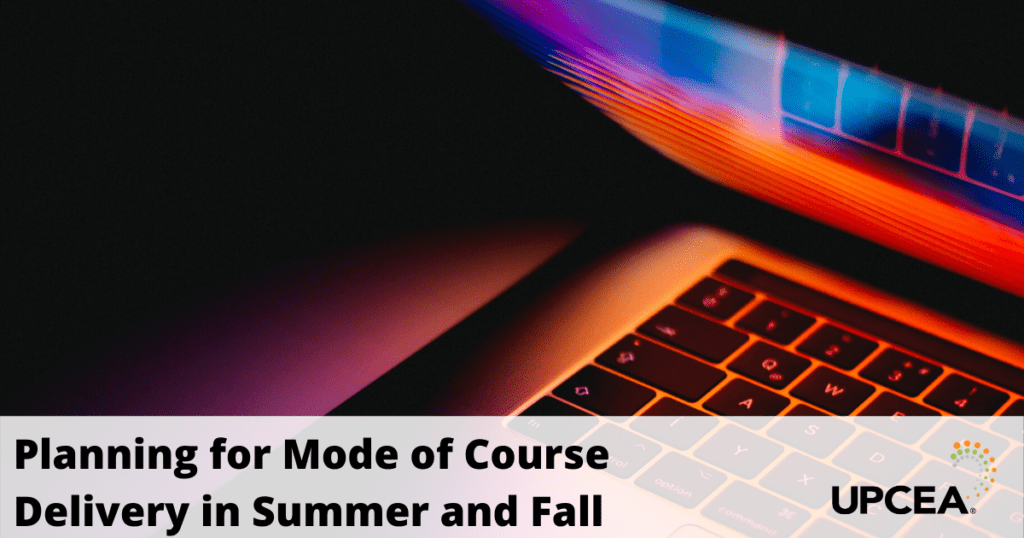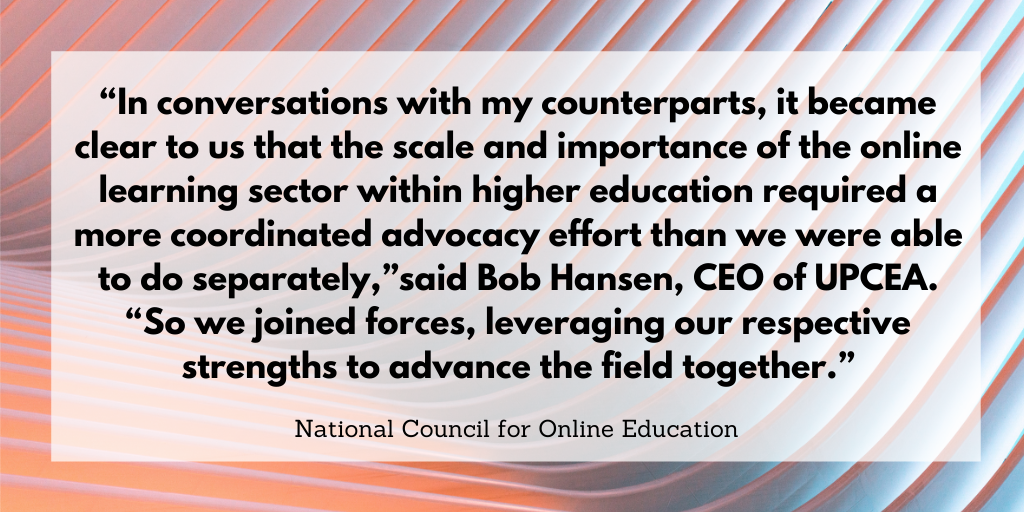Posts by UPCEA
Gen Z Takeover: Could online colleges gain traction with young students? (Education Dive)
Four-year universities have long encouraged students coming straight from high school to enroll in their campus-based programs while guiding older learners to their online divisions, creating a divide between the two groups. But Generation Z, whose members were born in 1997 or later, may prove to be the force that can break down those barriers.…
Read MoreOnline Education Advocacy Group Launches as Dept. of Ed Proposes Loosening Regulations (EdSurge)
To advocate for and on behalf of effective online teaching and learning practices, four organizations are joining forces to establish the National Council for Online Education. The partnership linking the Online Learning Consortium, Quality Matters, University Professional and Continuing Education Association and WICHE Cooperative for Educational Technologies has been in the works for about a year,…
Read MoreA Glimpse into the Future Economy after the Pandemic
COVID-19 has certainly changed our world, with more suffering yet to come. Many tragedies have reshaped society and the world economy. After the destruction and loss of life from 9/11, the financial markets and economy suffered in the short-term, but certain industries experienced longer lasting effects, primarily the airline, insurance, food and energy sectors. This…
Read MorePlanning for Mode of Course Delivery in Summer and Fall
As many of us are still grappling with the daily details of remote delivery of campus classes, we must turn our eyes to the summer and fall. Many of us have been working day and night to launch our campuswide remote learning response to the virus. Exhausting as that is, we should carve out some…
Read MoreUPCEA Welcomes Seven New Board Members
WASHINGTON, April 2, 2020 – UPCEA, the Washington, D.C.-based association for college and university leaders in professional, continuing, and online education, welcomed two new officers and five new directors to serve on the UPCEA Board of Directors during a virtual Board meeting on March 18. “On behalf of the Board Development committee and the entire…
Read MoreWellesley College Associate Provost and Founding Director of Strategic Growth Initiatives Nancy Coleman Serve as UPCEA Board President-Elect
WASHINGTON, April 2, 2020 – UPCEA, the Washington, D.C.-based association for university leaders in professional, continuing, and online education, welcomed Dr. Nancy Coleman as the association’s 2020-21 Board President-Elect during a virtual Board of Directors Meeting on March 18. Coleman is Associate Provost and Founding Director of Strategic Growth Initiatives at Wellesley College. As UPCEA…
Read MoreUniversity of Washington Continuum College Vice Provost Rovy Branon to Serve as UPCEA Board President
WASHINGTON, April 2, 2020 – UPCEA, the Washington, D.C.-based association for university leaders in professional, continuing, and online education, welcomed Dr. Rovy Branon as the association’s 2020-21 Board President during a virtual Board of Directors meeting on March 18. Branon is vice provost for the University of Washington Continuum College. Branon notes that the timing…
Read MoreEncourage your students to complete the Census
We are excited to announce that we are partnering with the U.S. Census Bureau to support the 2020 Census. As a partner, we will be working to make sure our community is accurately represented in the upcoming decennial count. The census counts everyone in the United States. Census results are the basis for congressional…
Read MoreLeading Digital Learning Organizations Partner to Establish National Council for Online Education
For Immediate Release OLC, QM, UPCEA, WCET join forces to advance online and digital postsecondary education WASHINGTON, April 1, 2020 – Four leading organizations in higher education and digital learning today announced a partnership to establish the National Council for Online Education (NCOE), creating a formidable voice for online and digital education within…
Read MoreKeeping you connected
While you are leading campus responses to the pandemic, our goal is to help you stay connected to the larger PCO community. This community, this professional association, is one of your greatest assets during this challenging time. Now more than ever we are learning from each other. Helping each other solve problems. Supporting each other. …
Read More


